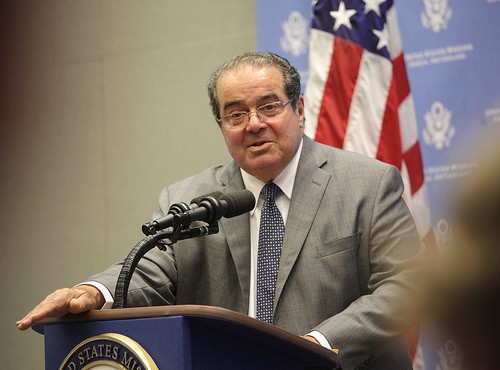There must be something in the air. Following closely on Pope Francis’s recent interviews, Supreme Court Justice Antonin Scalia has given quite the fascinating interview himself. Covering a wide range of issues – including personal ones – it gives us a chance to understanding the humanity behind the bench.
Justice Scalia sat down with Jennifer Senior for the current issue of New York Magazine. It’s a long and incredibly comprehensive interview. And it shows a public person confronting questions of faith and personal integrity, and striving to be true to himself and his beliefs, even in the face of their unpopularity and, at times, ridicule. When asked what makes an opinion “heroic,” Scalia speaks of opinions being “courageous”, citing his lone dissent in Morrison v. Olson and his decision not to recuse himself from the case in Cheney v. District Court.
This is, of course, not to say that I agree with him, or that anyone should, or even that he is correct. However, his focus is not on those opinions that win acclaim, or are likely to leave a lasting mark, but, rather, on those that take courage and personal integrity.
Beyond this, though, what is, for me, most impressive was that the entire interview was conducted between two people who clearly disagree on fundamental levels, yet remain engaged with each other. You can see it quite clearly in their exchanges about Scalia’s belief in the reality of the Devil:
So what’s [the Devil] doing now?
What he’s doing now is getting people not to believe in him or in God. He’s much more successful that way.
That has really painful implications for atheists. Are you sure that’s the Devil’s work?
I didn’t say atheists are the Devil’s work.
Well, you’re saying the Devil is persuading people to not believe in God. Couldn’t there be other reasons to not believe?
Well, there certainly can be other reasons. But it certainly favors the Devil’s desires. I mean, c’mon, that’s the explanation for why there’s not demonic possession all over the place. That always puzzled me. What happened to the Devil, you know? He used to be all over the place. He used to be all over the New Testament.
The interviewer’s incredulousness fairly jumps off the page. And, you can easily tell Scalia think’s she is being naive. Yet, despite their disagreements, they engage in a civil conversation — pointing out disagreements, explaining their own positions, and accepting differences. They even acknowledge — and apologize! — when they inadvertently offend each other. It is, in essence, a model dialogue. Something we ought to cultivate in our courts.
And If we want to move past the polarization of public life, it is exactly this sort of model we need.
******
Justice Scalia image courtesy Flickr user United States Mission Geneva



